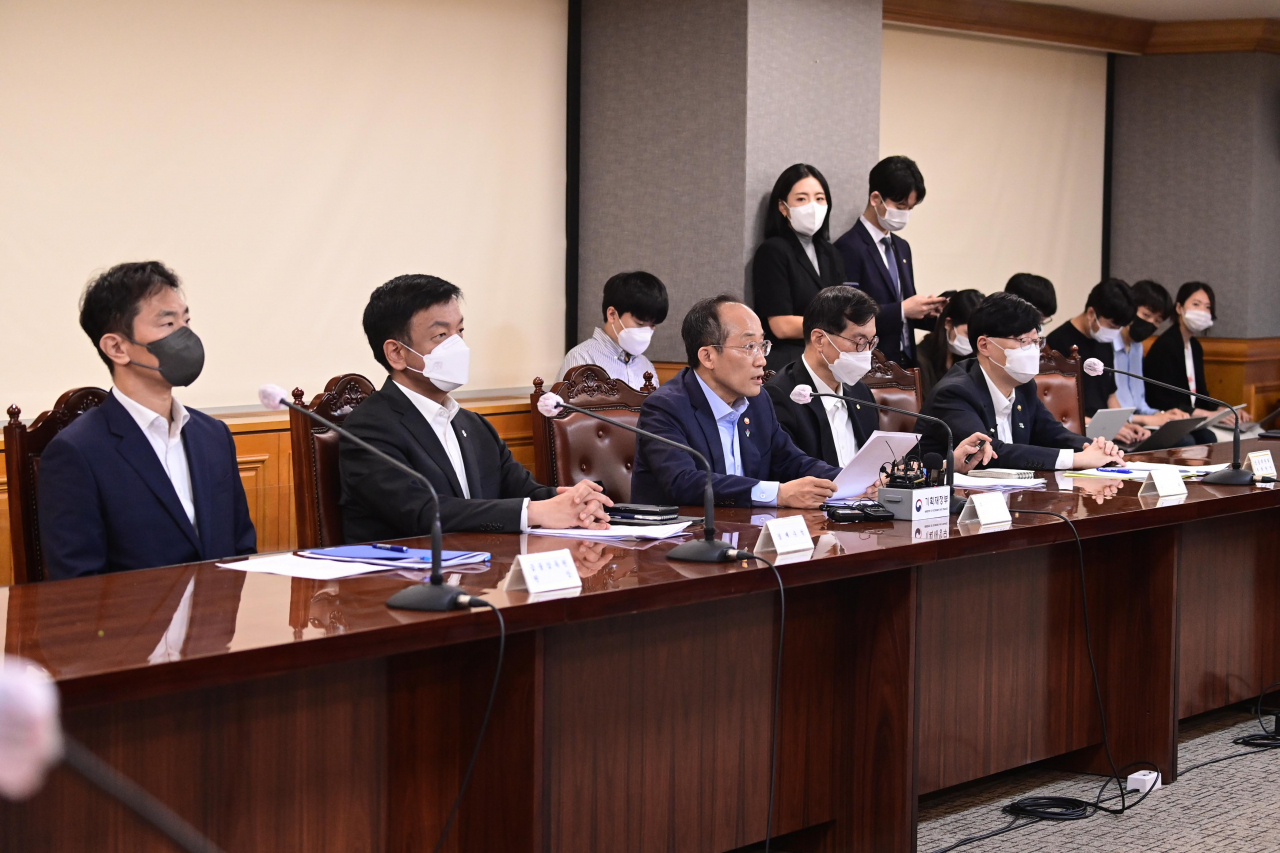S. Korea to closely monitor market after Fed's aggressive monetary tightening
By YonhapPublished : June 16, 2022 - 09:30

South Korea will keep close tabs on the financial market following the Federal Reserve's overnight rate hike decision as worries are growing over heightening volatility from the US' aggressive monetary tightening, the country's top financial policymaker said Thursday.
On Wednesday (US time), the Fed decided to hike its interest rate by 0.75 percentage point in the latest move to tighten monetary policy and tame soaring inflation. It marked the first such steep rate increase since November 1994.
Fed Chair Jerome Powell said the central bank is considering a 0.5 or 0.75 percentage-point rate hike in the rate-setting meeting next month.
South Korea's financial market has been subdued with its key stocks and local currency losing marked ground in recent days ahead of the Fed rate decision. The KOSPI fell for the seventh straight session Wednesday, ending at the lowest point in about 19 months, with the won falling to the lowest level since July 14, 2009.
"Anxiety is lingering that the global financial market will suffer increasing volatility as fears are drawing attention that accelerating (monetary) tightening could lead to an economic slowdown," Finance Minister Choo Kyung-ho told reporters after holding an extended meeting on macroeconomic situations with chiefs of the Bank of Korea (BOK) and top financial regulators in Seoul.
"With protracted uncertainty in place and the US Federal Reserve's accelerating rate increase, the government and the central bank shared the view that it is necessary to respond with a sense of extraordinary urgency," he added.
The government and the BOK agreed that monetary policy should be managed in a way that places more emphasis on fighting inflation and beefs up cooperation to prevent market jitters from spreading.
In particular, they agreed to raise their guards against excessive volatility in the foreign currency market and do their best to stave off herd behavior down the road, Choo said.
Following the Fed rate decision, the South Korean financial markets got off to a strong start, rebounding from recent setbacks.
The KOSPI jumped 1.86 percent in the first 15 minutes of trading on Thursday, while the local currency traded at 1,278.15 won against the US dollar, up 12.35 won from the previous session.
The won has been weakening against the greenback as global monetary tightening and its negative impact on the economy have increased risk aversion among investors. The local currency has fallen around 8 percent against the dollar so far this year.
In a verbal intervention earlier this week to forestall the local currency's steep downswings, the finance ministry said authorities will make efforts to prevent excessive one-sided movements in the foreign exchange market.
Following Thursday's meeting, Choo said the government and the BOK will carry out emergency buybacks and Treasury purchases "at an appropriate timing" if the local bond market suffers steep volatility.
As the Fed is expected to continue its aggressive monetary tightening in the coming months, concerns are rising that interest rates in the US could sooner or later become higher than those in South Korea, which could precipitate capital outflows from South Korea and cause more fluctuations in the local financial markets.
Asked whether the BOK will consider the "big step" of raising its rate by 0.5 percentage point next month, BOK Gov. Rhee Chang-yong said he and other monetary policy board members will decide how much borrowing costs will be raised by analyzing market and economic situations until the last moment.
Last month, the BOK hiked its policy rate by a quarter percentage point to 1.75 percent, the fifth increase since August last year. The central bank earlier hinted at further rate hikes to keep a lid on upward inflation pressure.
The BOK is to hold its next rate-setting meeting on July 13. (Yonhap)











![[Kim Seong-kon] Democracy and the future of South Korea](http://res.heraldm.com/phpwas/restmb_idxmake.php?idx=644&simg=/content/image/2024/04/16/20240416050802_0.jpg&u=)








![[Today’s K-pop] Zico drops snippet of collaboration with Jennie](http://res.heraldm.com/phpwas/restmb_idxmake.php?idx=642&simg=/content/image/2024/04/18/20240418050702_0.jpg&u=)